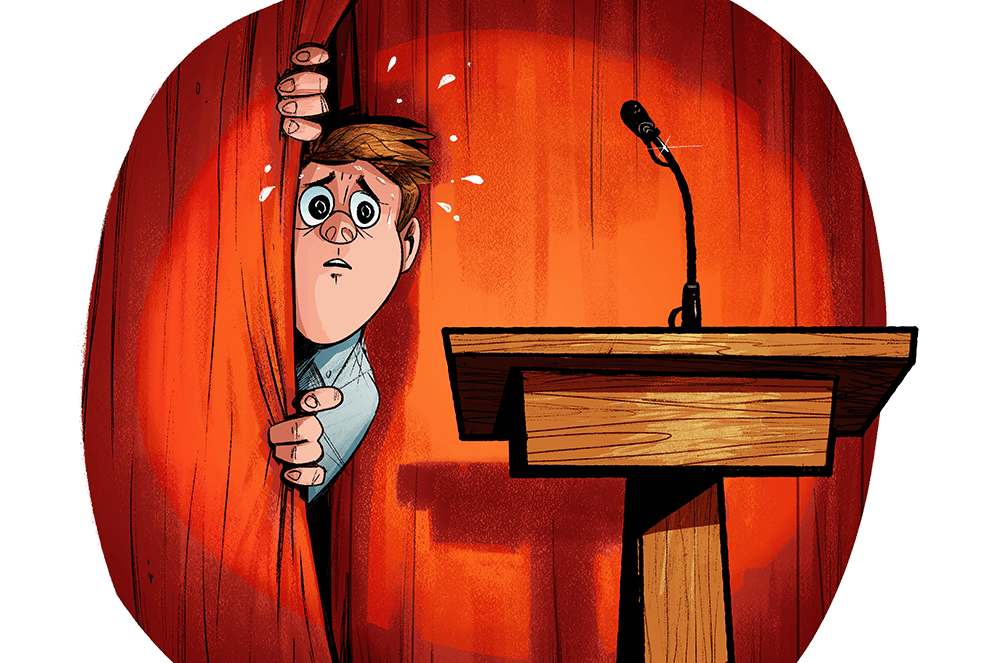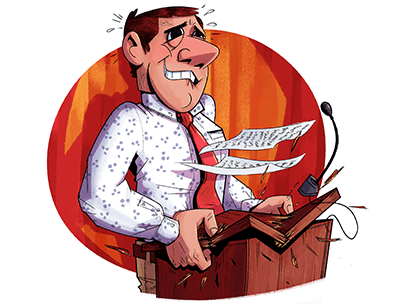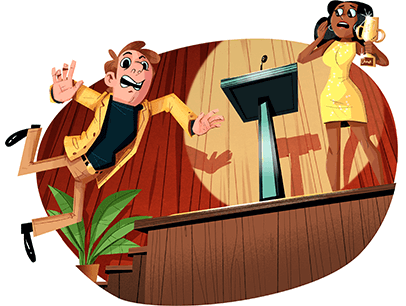
If you think Google can tell you everything there is to know, ask it to search “people who are not afraid of public speaking.” Research indicates that nearly 75% of people are afraid, so that leaves 25% who aren’t. Who are they? Google won’t tell you. It seems to assume you’re really in that fearful 75% category and have simply made a mistake, which it is happy to correct by offering you 10 trillion sites on … fear of public speaking!
That’s what you really wanted to know, right? Well, step right up! We’ve got classes, seminars, coaching, therapy, retreats, hypnosis (!), and more books than you can cram into the New York Public Library, including ones that don’t pull any punches, like Mike Acker’s Speak With No Fear. Mike promises that under his tutelage you’ll “go from a nervous, nauseated, and sweaty speaker to an excited, energized, and passionate presenter.” True enough, Mike—standing at the lectern is scary, but making it sound like a heart attack is not helpful.
Google’s ignorance is not only alarming; it’s insulting. Apparently, it doesn’t know about the hundreds of thousands of Toastmasters who have overcome their fears to become self-assured, polished speakers. Are they among the 25% that Google’s clutching global algorithms can’t seem to find? I believe they are. I think Google is jealous. Google can only speak through canned, electronic voices. Google has no compelling message to share. Google doesn’t know what to say until you ask it a question. Google has no body language. Google can’t give an Ice Breaker speech. Google is a dud.
If standing at the lectern feels like a near-death experience, why not just record your remarks and send everybody the link?
Even so, it’s an inescapable reality that most people, even the pros, do experience some level of glossophobia (fear of public speaking), from mild anxiety to acute hyperventilation, requiring that the speech be delivered through a paper bag over one’s head. For this latter group, I have to wonder: Why do it at all? If standing at the lectern feels like a near-death experience, why not just record your remarks and send everybody the link? The famous investor Warren Buffett was so scared of facing an audience as a college student that he deliberately picked classes which required no speaking to the class. He did eventually work hard to overcome his fear, because when you’re worth 102.4 billion, you want to tell people about it.
I’m being facetious, of course. I know why even panic-stricken people strive to be better speakers. For one thing, there are the examples of people like Winston Churchill, Martin Luther King Jr., Mahatma Gandhi, and Abraham Lincoln to show that a good speech can literally change history. You may not aspire to such heights, but even an above-average way with words will help you persuade the car salesperson to throw in the undercoating for free. The American President Gerald R. Ford said that if he could go back to college he would concentrate on writing and speaking in front of an audience, because “nothing in life is more important than the ability to communicate effectively.” This, from a man who said, “If Lincoln were alive today, he’d roll over in his grave.” Say what you will, the man made his point.
It’s curious. If public speaking brings so many rewards, why does it seem so threatening?
Well, that urban legend that people fear public speaking more than death itself actually has some truth to it. In your lizard brain—that pre-historic, instinctive, non-rational part of your gray matter that produces the fight-or-flight response—they amount to the same thing. Any caveman being watched by another caveman, or an animal, knew he was being stared at for one of two reasons—to be killed or eaten. So when you step up to the lectern and see thousands of eyes staring at you, your lizard brain says, “This might be a good time to get your affairs in order.”
Now, of course that’s not true, but to change that perception you have to argue with a lizard. And that’s the problem, isn’t it? Like most struggles in life, the enemy lies within. The problem is the person in the mirror. Thankfully, that person can change. Anxiety can become excitement. Fear can become motivation. Self-doubt can become self-assurance. Just don’t get too self-assured, believing your every word is a trumpet blast from heaven. That’s a dictator, and instead of the audience scaring you, you’ll scare the audience, resulting in what you do fear most: They probably won’t ask you back.
John Cadley is a former advertising copywriter, freelance writer, and musician living in Fayetteville, New York. Learn more at www.cadleys.com.



 Previous
Previous

 Previous Article
Previous Article

